Sustainable Duluth Workshop Series
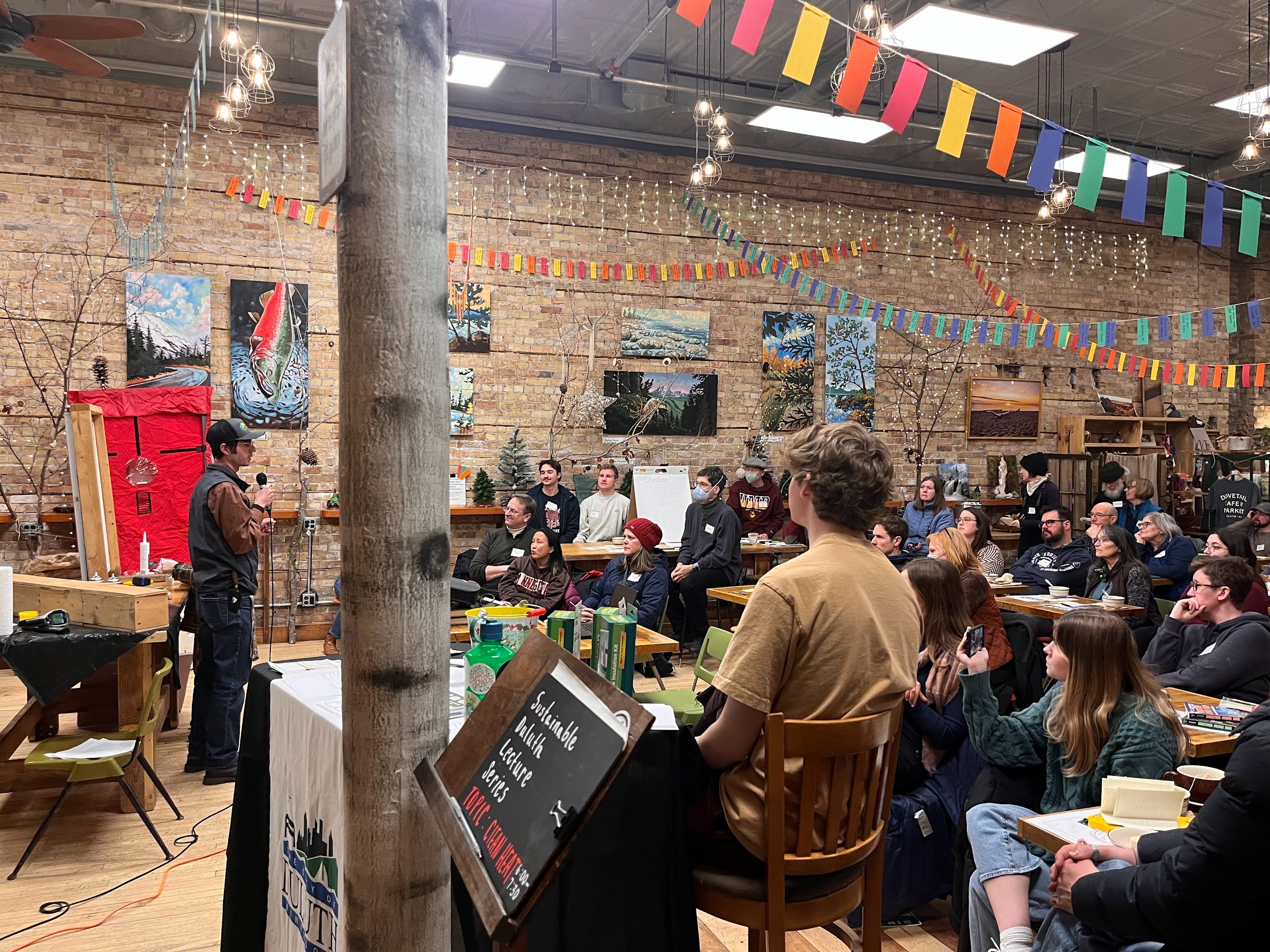
Sustainability staff with the City of Duluth have partnered with the Duluth Folk School to host monthly workshops on sustainability. At the January event, over 40 people attended to learn about clean heat solutions! People were interested in heat pumps, window insulation, and lowering energy consumption—and several experts spoke about opportunities to act in Duluth. If you weren't able to attend, here's what you missed:
Arbor Otalora-Fadner with the Center for Energy and Environment kicked off the evening. For over three years, he has been part of the Minnesota Air Source Heat Pump program, which is a statewide, utility-funded initiative to promote heat pump technology. He introduced the topic of clean heat and why it is important: hint: 70% or more of the average energy costs for Minnesotans are for heating fuels. Heating bills can make up an even higher percentage for folks who live in older homes. The best way to fight high energy bills is to, weatherize with insulation, use double-pane windows, and air-seal leaks.
A heat pump can lower energy bills, and most heath pumps work best in temperatures above 20॰F, although some cold climate models run down to -13॰F. An existing boiler or furnace can make an excellent backup for heat pumps if temperatures get too low. Heat pumps—despite the name—also function as highly-efficient cooling systems. Over the course of their 10-15 year lifespan, heat pumps and weatherization can decrease carbon footprints significantly.
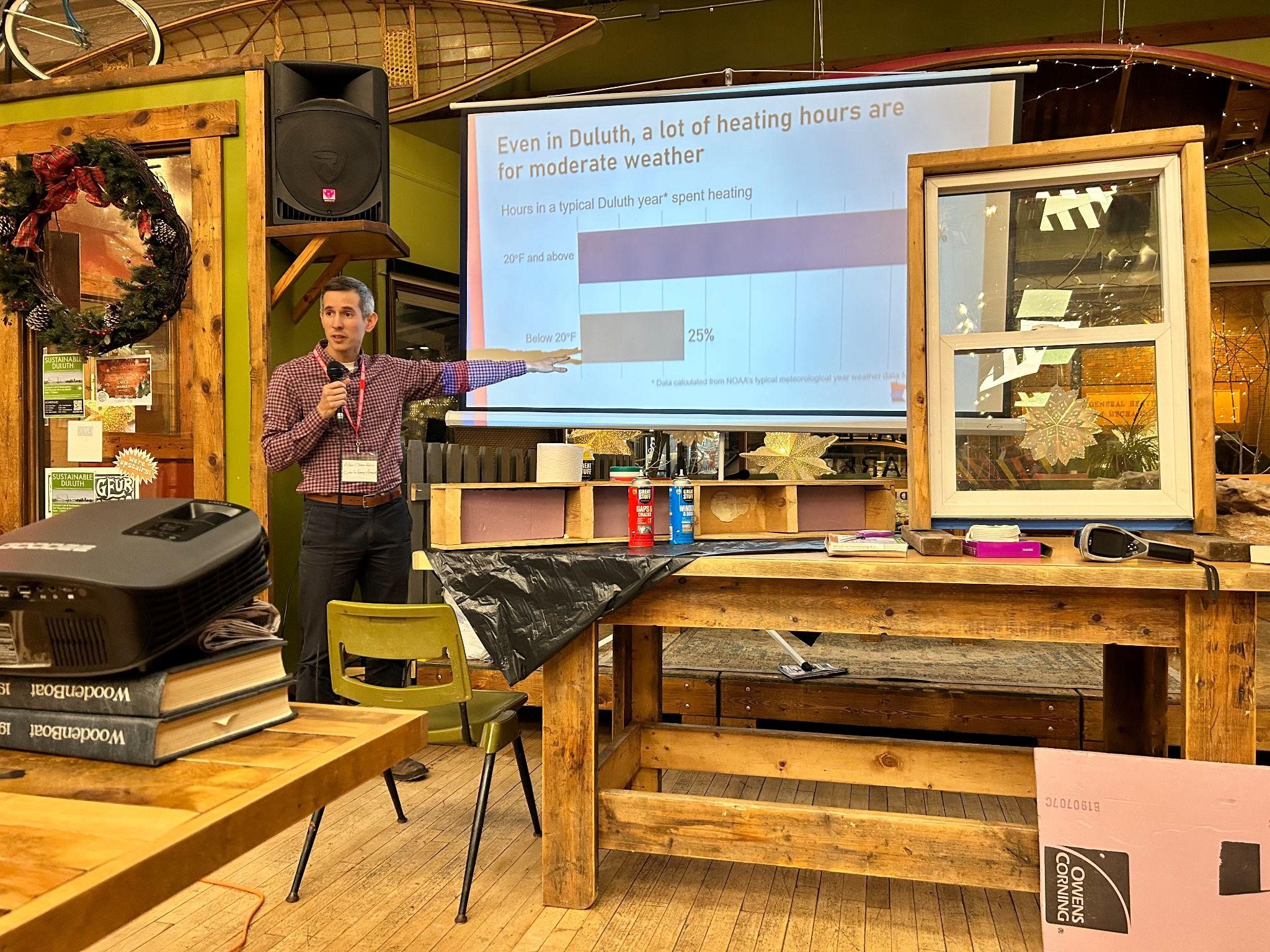
After heat pumps, a demonstration from Cameron Kadlubowski, the Community Energy Transition Specialist at Ecolibrium3 (Eco3) provided some hands-on learning. Eco3 provides energy audits which are the first place to start when improving your home's energy efficiency (you can request one here!). Cameron showed off the large red “blower door” testing equipment which depressurizes the house to determine how much heat is escaping from the home and locate drafts. The biggest benefit from getting an energy audit is understanding the air, ceiling, and insulation needs of the home. Once these needs are determined, homeowners can take action, like applying rope caulk to gaps between window frames, and using foam board or spray sealing rim-joists. It is important to start with an energy audit before taking action at your home, as an audit determines what is most necessary.
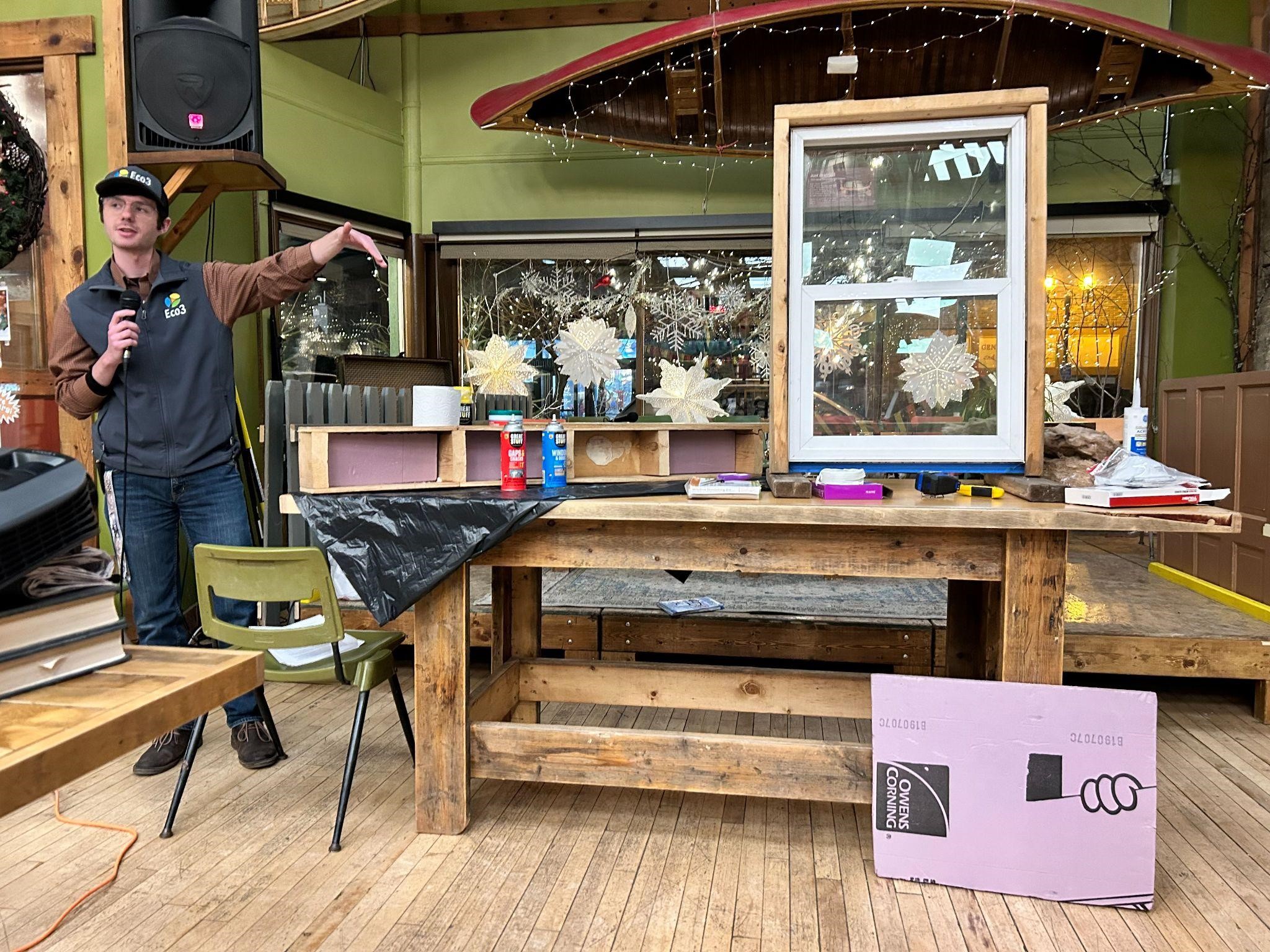
The night ended with a panel featuring staff from local nonprofits, a heat pump installer, a homeowner who installed a heat pump, and a Minnesota Power representative familiar with conservation programs.
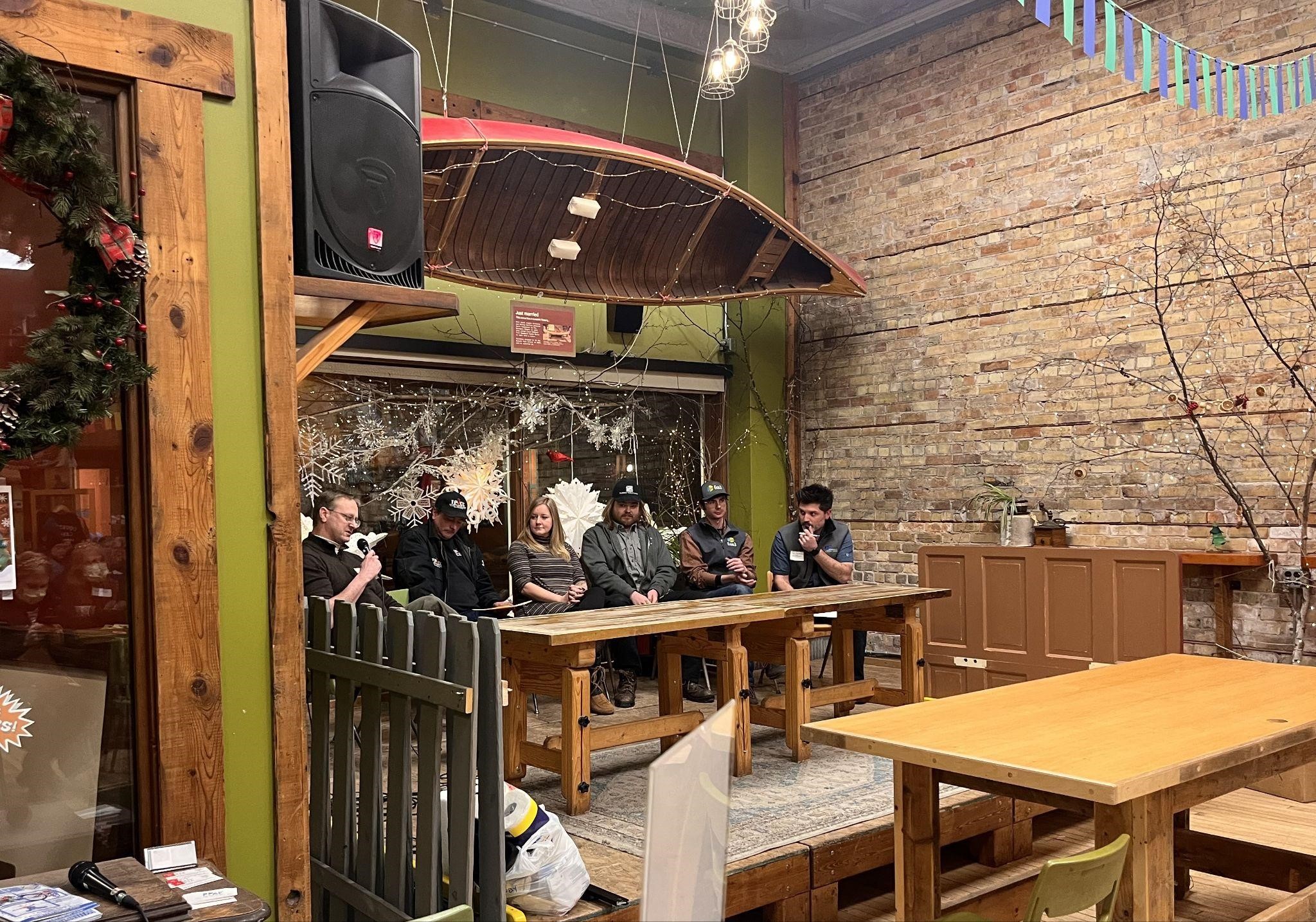
Bret Pence from Minnesota Interfaith Power and Light focuses on organizing and education in the greater MN region. He turned the audiences’ attention to the Inflation Reduction Act (IRA) benefits and encouraged Duluth residents and contractors to get the most out of both government and utility incentives. There are not only tax credits, but also rebates which allow you to get money back at the point-of-sale. Even moderate-income customers can be eligible—for example: a family of four making under $135,000 per year is eligible for Inflation Reduction Act benefits.
Bjorn from Twin Ports Custom Climate is a local heat pump installer. He explained how air-source heat pumps can heat at 400% efficiency, even at average January temperatures of 14॰F. The efficiency reduces heating costs and beats both natural gas and fossil fuel in long term, especially with MN Power Rebates and IRA benefits. Heat pump systems nowadays can be rated down to -13 ॰F, allowing for greater coverage.
Jonna Korpi from the UMD Office of Sustainability is a homeowner who received an energy audit from Eco3 and has now had a heat pump for two years. Her electric bill went way down the first summer and has helped greatly during the winter months after properly insulating the attic. Jonna runs her heat pump until it hits 5॰F. Their household fuel usage has also gone down, with Jonna only refilling once this year compared to four times in previous years. As an added energy bonus, Jonna’s household purchases electricity from the Minnesota Power community solar garden. Jonna says to be your own advocate and ask a lot of questions to find the best contractor for your situation.
Jager Moser from Arrowhead Economic Opportunity Agency, conducts home energy audits and tests heating systems to make them safer and more efficient. The testing, and subsequent work they do, is free for income-qualified homeowners. Attics, crawlspaces, and exterior walls can all be sealed to help reduce energy bills. The process to insulate and seal can take 4-8 hours, but it is free if you qualify.
Cameron Kadlubowski works at Ecolibrium3 (Eco3), a local nonprofit in the residential energy sphere for the past 15 years. With the IRA, state incentives, and MN Power, Eco3 is bringing energy efficiency to homes in the area through energy audits and on-the-ground work. Eco3 has low-income options for residents in the area and the office is also open if you want to walk in and ask questions.
Jon Sullivan from MN Power/ALLETE, shared that the utility is working to be carbon neutral by 2040 and was the first electric utility in the State of Minnesota to reach 50% renewable fuels. Heating with electricity is essentially cleaner heat and will continue to become cleaner. They offer rebates for air-source heat pumps and geothermal systems, as well as inspections. Check out their Find a Contractor tool if you're thinking about installing either one.
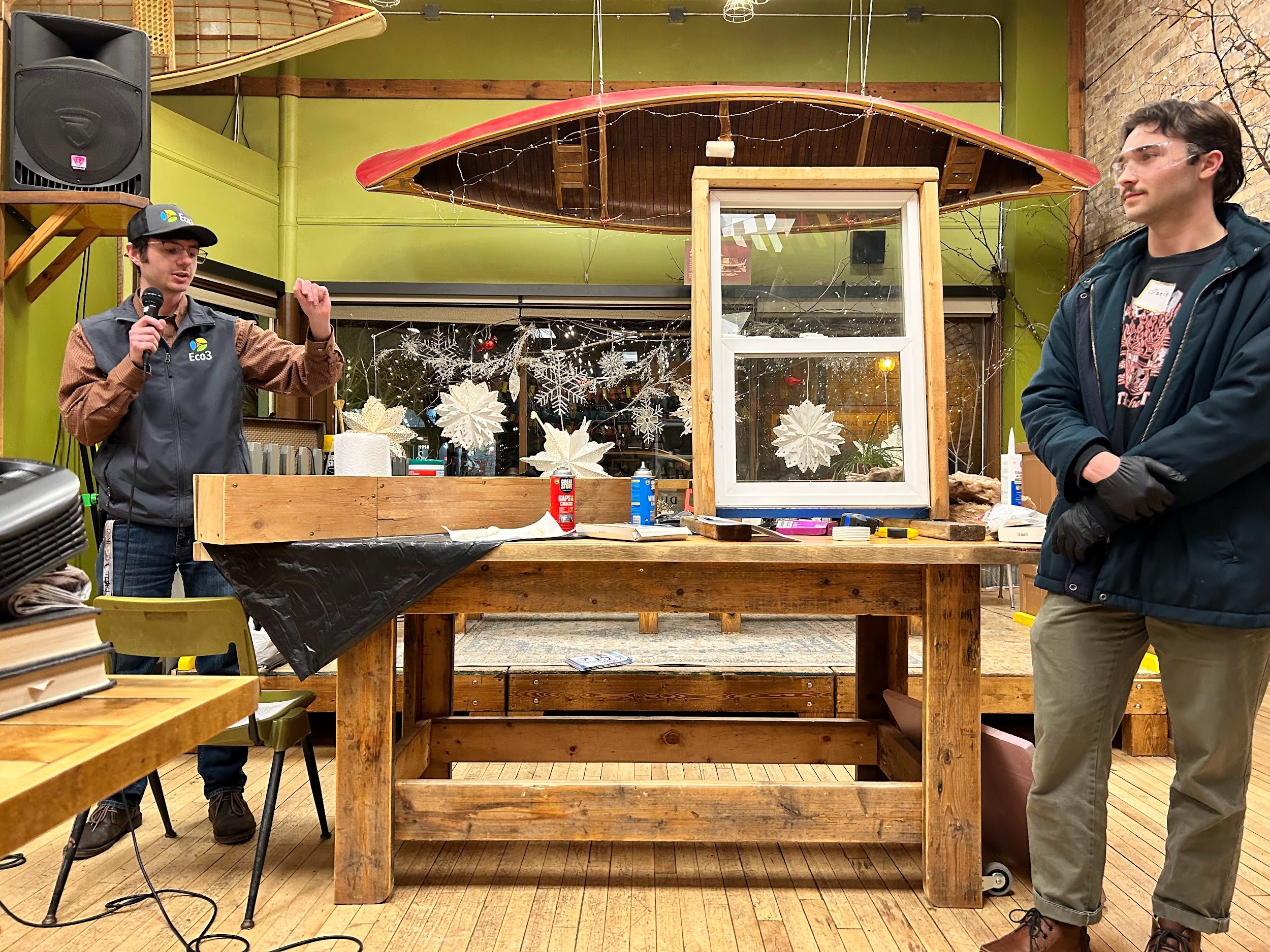
Do you have questions after this session about rebates and incentives? Come to our February session, which will dive into the intricacies of funding sources for these projects. There are several programs, tax incentives, and rebates out there—but where can one start? Find out on Thursday, February 15th, 6-7:30pm!




